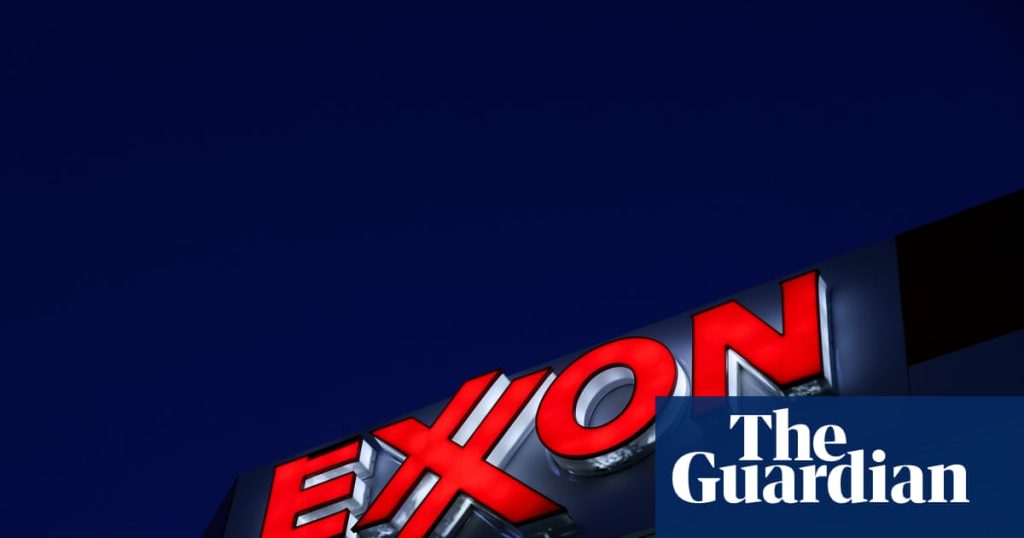Exxon funded rightwing thinktanks to spread climate change denial across Latin America, according to hundreds of previously unpublished documents that reveal a coordinated campaign to make the global south “less inclined” to support the UN-led climate treaty process
The documents, which include copies of the actual cheques Exxon sent, consist of internal documents and years of correspondence between the Texas-based fossil fuel company and Atlas Network, a US-based coalition of more than 500 free-market thinktanks and other partners worldwide.
The money Exxon sent to Atlas Network helped finance Spanish and Chinese translations of English books denying that human-caused climate change is real; flights to Latin American cities for American climate deniers; and public events that allowed those deniers to reach local media and network with politicians.
One goal was to convince the developing world of “the adverse effects of global climate change treaties”, Atlas Network explained to its fossil fuel donor.
According to a strategy proposal “dealing specifically with the problems of international treaties” that Atlas sent by mail to the company’s headquarters in Irving, Texas, “this investment in market-oriented public policies is a vital key to our future prosperity and wellbeing – and to continued strong returns to Exxon’s investors.”
Asked about this document and others, the Atlas Network spokesperson, Adam Weinberg, replied that “these questions deal with memos and materials drafted by former employees from more than a quarter century ago, addressed to a corporation that was never an important donor to our organisation, and which indeed has not been a donor at all for close to two decades.”
Exxon did not respond to requests for comment.
“The atmosphere has a huge historical memory when it comes to greenhouse gas emissions,” said Carlos Milani, a professor of international relations at Rio de Janeiro State University’s Institute of Social and Political Studies. “What happened 30 years ago matters very much.”
This correspondence took place during the late 1990s and early 2000s and was obtained by the climate investigations site DeSmog.
Stoking confusion and doubt about climate change among developing nations, as Exxon and Atlas Network sought to do during critical early moments of climate diplomacy, exacerbated geopolitical faultlines and economic fears that still persist to this day, according to Kert Davies, director of special investigations at the non-profit Center for Climate Integrity.
“That’s a pretty ugly history,” he said. “Exxon seemed to think that if you could make developing nations, and all nations, sceptical that climate change was a crisis then you’d never have a global climate treaty.”
With Brazil about to host the Cop30 climate negotiations in the Amazonian city of Belém in November, the consequences of three decades of insufficient global action are impossible to ignore.
Scientists announced in mid-October that worldwide emissions are so high, the planet has passed the tipping point at which a mass die-off of the planet’s coral reefs is probably irreversible. Without drastic global cuts to emissions and deforestation, a collapse of the Amazon rainforest could be locked in within the next 10 to 20 years.
Throughout the 90s and 00s, Exxon helped fund and lead a constellation of US-based organisations that sought to discredit climate science and block America’s participation in a UN-led climate treaty – a campaign that is now the subject of dozens of lawsuits accusing the company of lying to the public about the climate emergency.
But by 1997, Exxon was “comfortable with the support we provide to US-based organisations and on US-related issues”. It asked Atlas Network for help “in nurturing free-market thinktanks outside the United States”, particularly in Asia, the former Soviet Union, Europe and Latin America.
The following year, Exxon sent a $50,000 check to Atlas Network – which adjusted for inflation would be roughly $100,000 today. The oil company’s goal was to grow “international groups which have the ability to influence government policies”.
Atlas Network later reported back that its partners in Latin America had produced a Spanish translation of a booklet by Fred Singer entitled “The Scientific Case Against the Global Climate Treaty” which claimed “there is no significant scientific support for a global ‘threat’ of climate warming”.
Atlas Network partners, including the Argentine thinktank Fundación República para una Nueva Generación and the Brazilian thinktank Instituto Liberal, led and participated in seminars in Argentina on the eve of the Cop4 climate talks in Buenos Aires.
At least one event featured the now-deceased US climate denier Patrick Michaels, who had referred to climate change as “hysteria”. Atlas Network had aimed to introduce Michaels and other American speakers to “ministers, politicians, editorial boards [and] business leaders”.
Atlas facilitated translating Singer’s booklet into Chinese, as well as organising meetings between an India-based thinktank called Liberty Institute and US rightwing groups that have disputed the scientific consensus on climate change, including the Heritage Foundation and the Cato Institute.
Summarising its activities in a 1998 letter to its donor, Atlas Network reported that “few of these accomplishments would have been possible without Exxon Corporation’s generous financial assistance”. Exxon stressed that it did not want to be identified publicly.
“The approach has been behind-the-scenes, intentionally not seeking public kudos for its efforts,” Atlas wrote in notes summarising a meeting with Exxon executives in 2000. “The objective is to help, but not be known for its help.”

